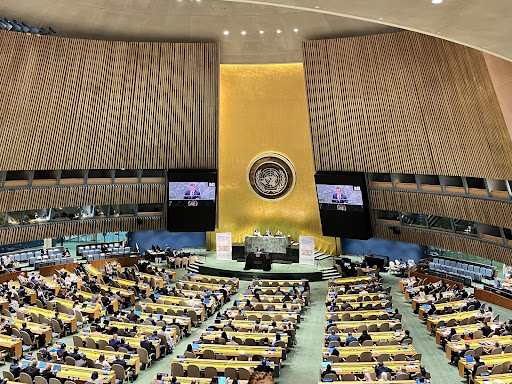Paulina Carmona (University of California-Davis, United States) and Mohammad Hosseini (Northwestern University, United States) represented the GYA as part of the International Science Council (ISC) delegation attending the High-level Political Forum (HLPF) 2023 in the United Nations headquarters in New York City. The primary goal of this event was to “address the impacts of the COVID-19 pandemic on the Sustainable Development Goals (SDGs) and explore actionable policy guidance for the full implementation of the 2030 Agenda and the SDGs at all levels.”
During the session on “SDG 9 and interlinkages with other SDGs – Industry, innovation and infrastructure,” Mohammad delivered a statement on behalf of the GYA at the main gallery. The theme of this session was “Accelerating the recovery from the coronavirus disease (COVID-19) and the full implementation of the 2030 Agenda for Sustainable Development at all levels.”
Mohammad’s statement highlighted ethical aspects of knowledge sharing and the negative impacts of knowledge silos on achieving the SGDs. He used two examples to demonstrate this issue, the non-disclosure of knowledge in developing COVID-19 vaccines and the recent advancements in generative Artificial Intelligence where training data sources remain undisclosed.
Paulina moderated a discussion during the Science Day at the HLPF 2023 – International Science Council (jointly organized by the ISC, the Stockholm Environment Institute, the United Nations Development Programme, the Sustainable Development Solutions Network, and the United Nations Department of Economic and Social Affairs). In this special event of the HLPF for Sustainable Development 2023, decision-makers, scientists, NGOs and other groups gathered to discuss science-based SDG achievement. Paulina chaired the table that discussed concrete examples to improve underlying critical conditions for SDG implementation, bringing examples from diverse GYA initiatives.
The GYA’s attendance at the HLPF 2023 was facilitated by the International Science Council, of which the GYA is a member, and was a testament to the unwavering dedication of young scientists towards addressing global problems. Given the challenging road to achieving the SDGs by 2030, young scientists’ collaboration is pivotal in bridging the gap between academia and policy-makers. As we get closer to the 2030 deadline, the role of young scientists will only become more crucial in fostering partnerships, and ensuring that the world stays on track with its ambitious goals.
